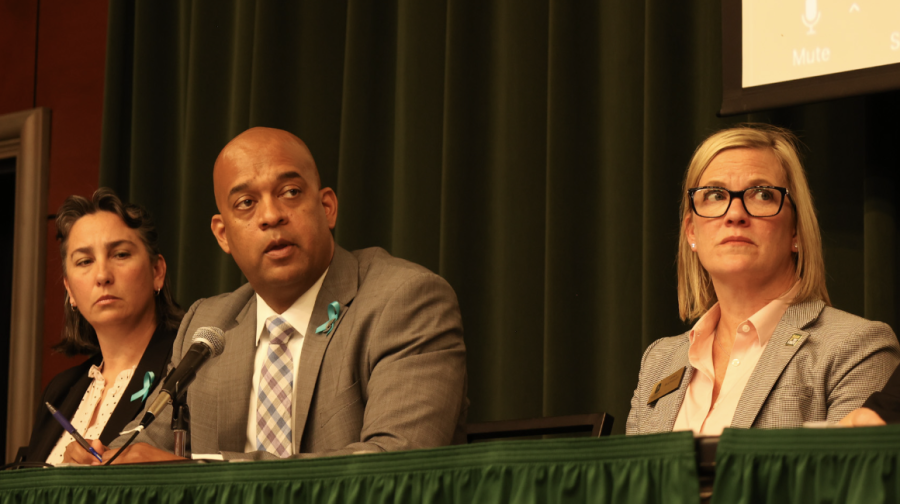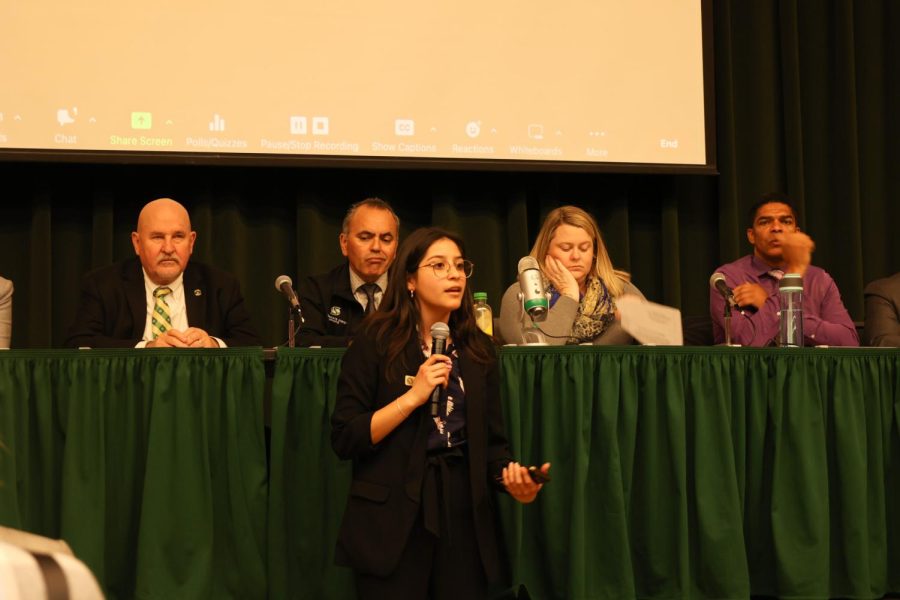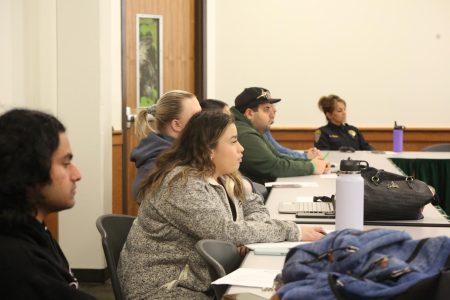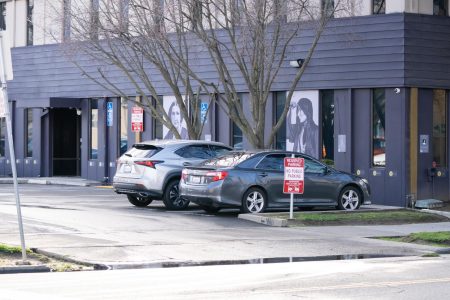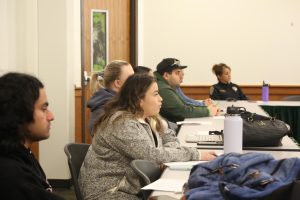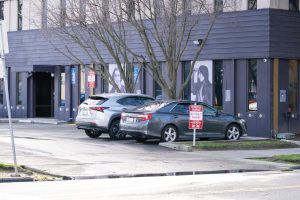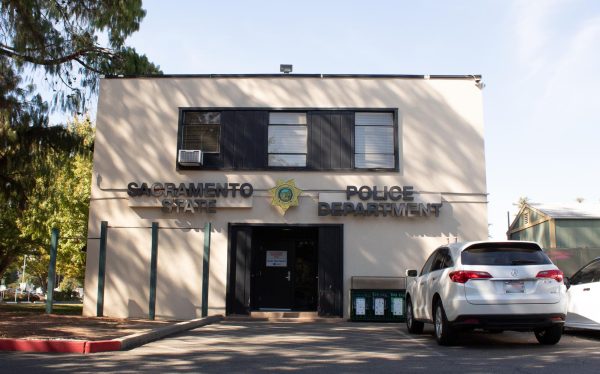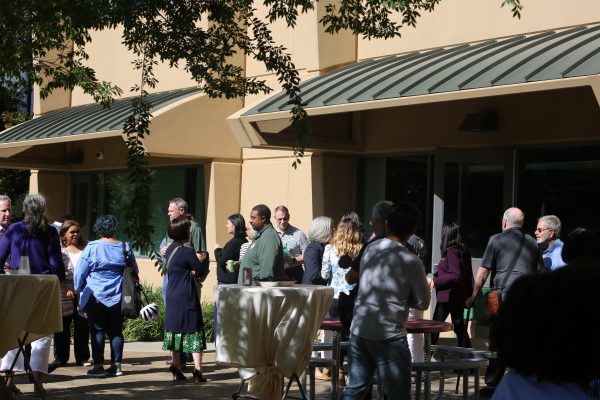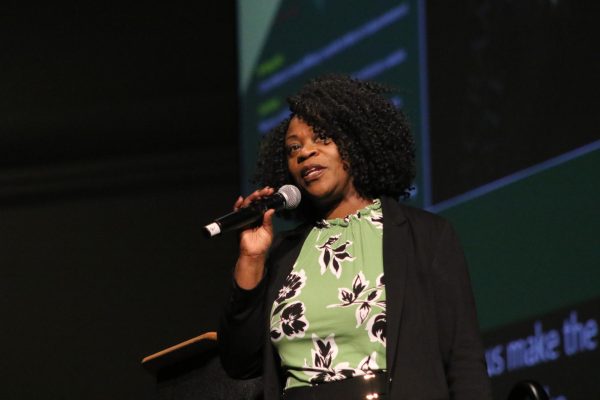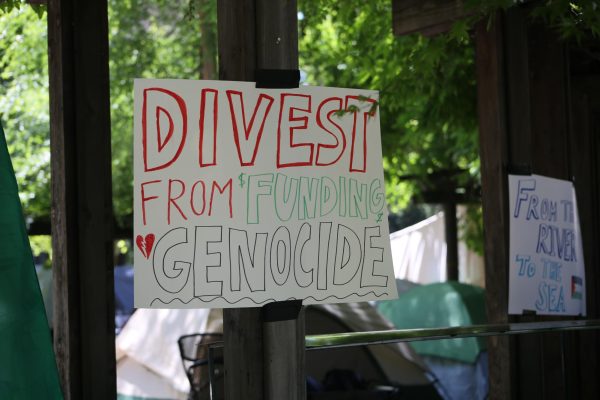‘This campus is safe’: ASI holds town hall on multiple sexual assaults
Frustrations from students continue
(L-R) Deputy Chief Christine Lofthouse, Police Chief Chet Madison and the President Office’s Chief of Staff Sarah Billingsley listening to students share their experience with sexual assault. Madison said Sac State is a “safe campus” adding that he’s dedicated to making students safe.
April 3, 2023
The Associated Students of Sacramento State, Inc. hosted a town hall focused on sexual assault in the University Union’s Redwood Room Monday.
Members of the panel went over the university’s Sexual Violence Prevention, Safety and Support Action Plan and the steps they’ve taken to enforce a safer campus. Policies in the plan include safety escorts and increasing lighting near Eureka Hall and some of the walkways.
Chet Madison, Jr., the Police Chief at Sac State, said he has remained invested in the community since taking the job as Chief in September 2021. According to Madison, Sac State is safe because of the type of crime and number of calls. Madison also said he’s dedicated to making campus safer.
“This campus is safe,” Madison said. “My daughter attends this campus at night and I truly believe this is a safe campus.”
Story continues below video
Mia Settles-Tidwell, Vice President of Inclusive Excellence, agreed, adding Sac State also has a sexual violence harassment action plan. She said, while it makes her sad that assaults happen, most of these incidents are peer to peer and in places that aren’t actively patrolled by police.
Earlier in the event, Settles-Tidwell said that “any sexual assault on this campus is too much.”
“Sometimes [assaults happen] in a room where you think you’re safe with a friend and they decide to not listen to them,” she said.
Last fall, a majority of reported sexual assaults occurring on or around campus were not students, including those carried out by Nida Muhammad Nyazi, who was extradited from Germany because of suspected involvement in multiple sexual assaults.
Sidra Nawaz, ASI Legislative Affairs Coordinator, responded to Madison’s comment, acknowledging that the campus is safe to a certain extent, but not for everyone. The perspective is different for students and especially for those from communities that are targeted by hate groups.
“I think it’s very easy to say the campus is safe if you’re a police officer who wears a uniform,” Nawaz said. “How can you say ‘the campus is safe,’ blanket statement? It seems very dismissive.”
Story continues below video
Deputy Chief Christina Lofthouse said students have confidential victim advocates in case they feel that their safety may be compromised.
“I would highly recommend any students who are worrying about safety to reach out to our mental health counselors and victim advocates and they will support you in a competent, safe way,” said Lofthouse.
I think it’s very easy to say the campus is safe if you’re a police officer who wears a uniform. How can you say ‘the campus is safe,’ blanket statement? It seems very dismissive
— Sidra Nawaz
Nawaz, who also spoke during the event, described the mental state of survivors and how to be equipped to help in these instances. Survivors of sexual assault can often feel pressure to cooperate or proceed with a case even when they aren’t mentally in a state to do so, she said.
“I think there should be an opportunity where you can get someone involved after you’ve had some time to process,” Nawaz said. “Some kind of mental health official — someone who’s capable of handling that role — should take that on first, then involve law enforcement.”
Delilah Augustine, a first-year philosophy student, said while living in North Village, she received phone calls she described as “borderline harassment.” Augustine brought the incident to Madison’s attention directly but said the situation was dismissed by the officer she spoke to.
In response, Madison said that was the first time he heard of the incident and told Augustine he would “truly encourage her to come forward.” Lofthouse added that the department is working towards increasing its female representation.
“Sometimes those conversations — you need to have with another female,” she said.
Kate Udall, a women and gender studies and social work major, mentioned they were worried about the town hall being performative because the issues being discussed are systemic.
We have a majority female campus and there’s still a deep culture of fear that needs to be addressed.
— Kate Udall
“I appreciate the urgency around the issue; I think there’s always work to be done,” Udall said. “We have a majority female campus and there’s still a deep culture of fear that needs to be addressed.”
Kathleen Dufort, a mechanical engineering major from Sierra College who is contemplating transferring to Sac State in the fall said the sexual assaults happening on campus will definitely impact her decision to attend the university.
“As someone who doesn’t want to feel bothersome to have someone escort me, I just want to feel safe on the campus walking around,” Dufort said. “If I live nearby and I’m biking or walking home, I don’t want there to be an issue.”
William Wyatt, a fourth-year philosophy major, said he feels like most students would not be convinced that the university’s written plan is enough to bring about enough change.
“They’re not reassured by trainings, they’re not reassured by swag,” Wyatt said. “For these problems to be solved, they need something more.”
In response to Wyatt’s statement, President Robert Nelsen referred to Sac State’s Graduation Initiative, which he said has increased graduation rates in the past eight years, and the antiracism and inclusive campus plan, and other campus initiatives.
Salma Pacheco, ASI President said she feels the town hall went well, adding that everyone in attendance was able to take something from it.
However, when addressing the low attendance, Pacheco took responsibility and said she was disappointed in the turnout. The in-person attendance was around 25, while the Zoom attendance was 21.
“That is my fault on behalf of ASI, we didn’t circulate the news fast enough or enough in general, which is my fault, ” Pacheco said. “I have a lot of responsibilities and I dropped the ball on this one. I could have circulated the Zoom quicker or the flier sooner, so not circulating the information led to little student attendance.”
Pacheco said ASI will circulate the meeting through the ASI website and students interested in watching can do so.


























































































































